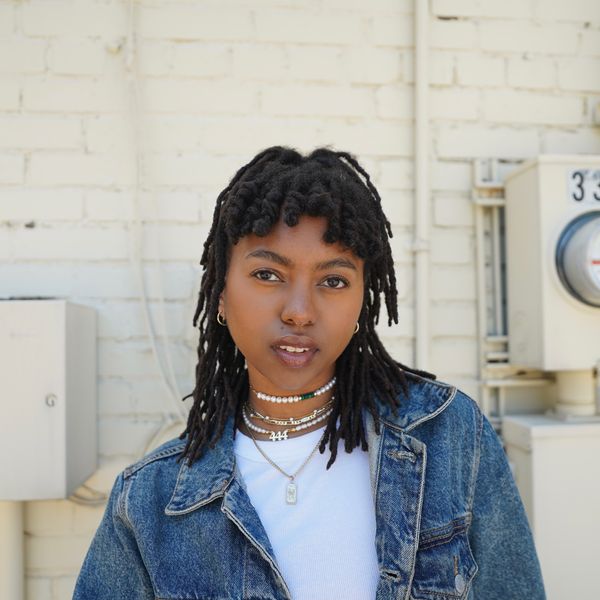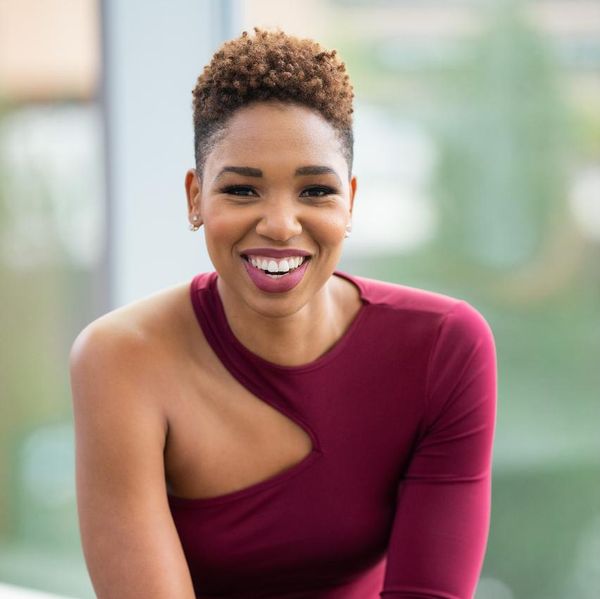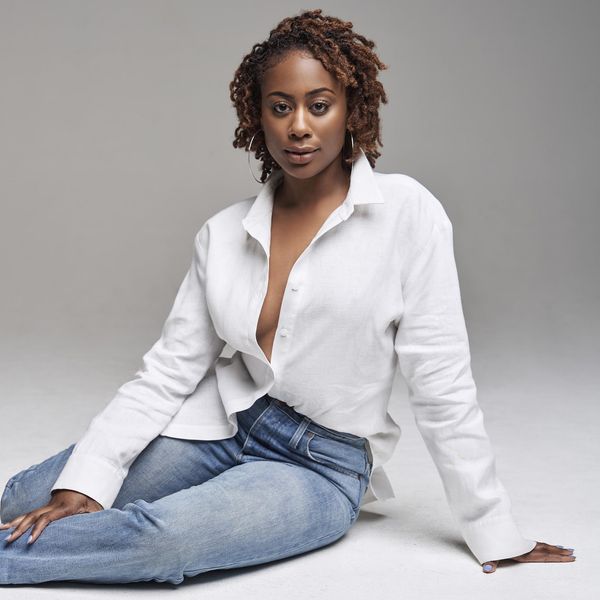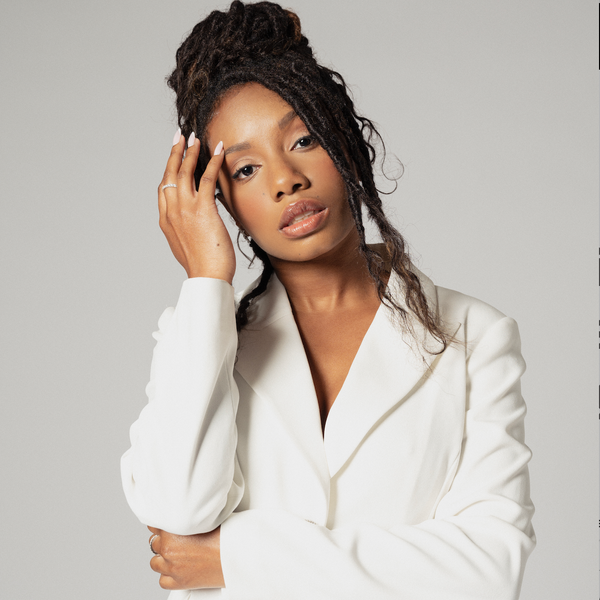
This Physician Believes Saying 'No' Is Key For Self-Preservation
In xoNecole's Finding Balance, we profile boss women making boss moves in the world and in their respective industries. We talk to them about their business, and most of all, what they do to find balance in their busy lives.
As the summer comes to an end, we must welcome the time for change. Say goodbye to summer and hello to cooler weather! And we know what that means ladies: We have to switch up our fashion trends, how we wear our hair, and even our skincare routines. When it comes to skincare, we as Black queens have to make sure our products are on point for all the seasons. It is crucial for us to protect our blessed and melanated beauty.
You would think with the amount of trends and dollars being put behind beauty brands, that there would be better representation in the medical field to help us understand our skin better from the jump. Unfortunately, Black physicians only make up 5% of the physician population, and if we want to talk about Black dermatologists specifically, well that number is even lower.
Recently, I interviewed Brianna Olamiju, a resident doctor who graduated this past May and is joining that 3% helping to keep all shades of our skin healthy and poppin'. Brianna's interest in medicine began during childhood. She wondered why few doctors looked like her. As a college student, she majored in race and ethnicity studies at Columbia University in New York City and went on to attend medical school at Yale University. Now that she's in a new chapter in her journey, Brianna is focusing on balancing her personal as well as her professional life.
"Before I am a physician, I am a friend, a daughter, and a mentor. While I love being a doctor, those are the titles I cherish the most."
Representation is so important for our community, in all industries. We must receive the best care from our doctors, especially those who look like us. In this installment of Finding Balance, we talked to Brianna about being a Black woman in medicine, setting personal goals, and the importance of your own self-care survival kit.

Courtesy of Brianna Olamiju
What is your WHY?
Brianna: Each and every day, I go to work to serve my patients. I know there are a lot of patients in need and I see the joy on some of their faces when I walk in the room and they see a Black doctor. My goal as a Black doctor is to help decrease healthcare disparities. I didn't see a lot of Black doctors growing up, so I aspire to be someone younger girls can look up to if they want to pursue the medical field as well.
At what point in your life did you understand the importance of pressing pause and finding balance in both your personal and professional life?
So, as you can probably guess, medical school is very demanding. There were times where I would question myself about how badly I really wanted this. I remember studying for my first board exam for three months and it would take 8 to 10 hours each day. I would find myself feeling really sad and anxious during that time. Then, I realized I had to take a step back and start taking better care of myself. So I started reconnecting with my family and friends and added working out more into my routine to feel more balanced.
What did a typical week in medical school look like for you?
In medical school, each year is different. In my last year of my medical school, I did a research year, so I was studying dermatological conditions on [minority] patients. I would visit different patients and learn their stories of what they were experiencing. There were also times when I would run data stats to see what treatment options are best for patients to help their skin.
How do you wind down at night?
I usually try to go to a gym class because it gives me the structure that I need. In the gym, I've also been able to find community. The gym has really helped me let go of the day and get ready for the next one.

Courtesy of Brianna Olamiju
What advice would you give other Black women who are looking to pursue medical school?
Medical school can be hard for anyone, but [going to] medical school and being a Black woman can make things tougher. You are going to experience microaggressions and it's important to assert yourself to remind people that you belong there. We are needed in the field so you must push through, ignore the naysayers, and remember your why.
What would you say is your favorite self-care practice and why?
After a long busy day, I like to give myself quiet time. I like to reflect on the day and I like to reaffirm myself. Being the only Black woman can really negatively affect your self-confidence so I love meditation and my quiet time. I have so many thoughts swirling in my head all day, so during that quiet time, I am able to process my thoughts better. After being by myself away from the noise, I feel recharged and ready to take on anything.
What advice do you have for busy women who feel like they don’t have time for self-care?
To-do lists have been so key for me. Ever since college, I have been using to-do lists to help keep me on track. Checking off something from your list is a really good feeling, too. Another thing that I encourage women to do is to just say "no." While a lot of people want to get a "yes," saying "no" is a form of self-preservation. Saying "yes" all the time to different people can get so draining. So once you learn to say "no," it makes you feel better and it is the best boundary you can create for yourself in order to really prioritize self-care.
"I encourage women to do is to just say 'no.' While a lot of people want to get a 'yes,' saying 'no' is a form of self-preservation. Once you learn to say 'no,' it makes you feel better and it is the best boundary you can create for yourself in order to really prioritize self-care."

Courtesy of Brianna Olamiju
When you are going through a bout of uncertainty or feeling stuck, how do you handle it?
I usually like to lean in on my people or my family for advice and get their feedback. But more importantly, I pray when I am feeling anxious and focus on calming my mind, whether that is [by] listening to some smooth R&B or meditative sounds.
What are some lessons about unhealthy habits you learned from in medical school that you apply as a full-time dermatologist?
I've learned that less is more. It is better to be involved in a few activities and completely immerse yourself in them rather than being in too many activities and spreading yourself thin. In the beginning, I thought it would look good on my resume to be involved in a lot of things to impress people, but I learned from my mentors that it is better to be deeper in a small number of activities than shallow in many activities. So when trying to balance it all, I'll make sure I have enough on my plate where I still have room to just breathe.
If you could create your own self-survival kit, what would be the top three self-care items you'd list?
On this list would be another list and that is my to-do list (laughs). The next thing on my list would be a reminder to get seven hours of sleep a night. Sleep is everything for me. My third item is my skincare routine. As a dermatologist, you know I have to add that in there, as cheesy as it may sound!
What does success mean to you vs happiness?
I consider success to be building your career and reaching those personal milestones—when you're really making sure you're growing every single day. For happiness, happiness is being at peace with yourself. You feel comfort with yourself, your future, and surrounding yourself with the people you love the most.
For more about Brianna, follow her on Instagram @brianna_med.
Learn more about Brianna by following her on Instagram @brianna_med.
Featured image courtesy of Brianna Olamiju
'K' is a multi-hyphenated free spirit from Chicago. She is a lover of stories and the people who tell them. As a writer, 9-5er, and Safe Space Curator, she values creating the life she wants and enjoying the journey along the way. You can follow her on Instagram @theletter__k_.
How This New Bond Repair Line Transformed One Mother's Postpartum Shedding Into The Ultimate Curl Comeback
This article is in partnership with SheaMoisture
For Crystal Obasanya, her wash day woes came shortly after her son did. The beauty and lifestyle content creator had been natural for years, but during postpartum, she quickly learned about one reality many mothers can relate to experiencing: postpartum hair loss. “Sis had thinning hair. Sis had split ends,” she shared about her hair changes in a Reel via xoNecole.
Over a year into her postpartum journey, Crystal explained she also had dry, brittle hair, noting that keeping it hydrated before pregnancy had already been “a task.” The 4C natural recalled going from thick hair during pregnancy to a thin hairline due to postpartum shedding as “devastating.” When it came to strengthening and revitalizing her hair, the new SheaMoisture Bond Repair Collection was just the thing she needed to elevate her damaged coils to revive and thrive status and get them poppin' again.
SheaMoisture is providing us with the cheat code for transforming dry and damaged strands into thriving and deeply nourished crowns. By unveiling their 4-step hair system, the SheaMoisture Bond Repair Collection is equipping you with the tools to reverse signs of hair damage caused by protective styling, heat, and color and is uniquely formulated for Type 3 and 4 hair textures.
The haircare system revives damaged natural hair by repairing and rebuilding broken hair bonds through a game-changing combination of HydroPlex Technology and AminoBlend Complex, a unique blend of fortifying amino acids formulated specifically for curly and coily hair. Scientifically proven to reduce breakage by 84% and make your hair six times stronger (vs. non-conditioning shampoo), the collection infuses your hair with the nourishment it craves and the strength it deserves.
All five products of the SheaMoisture Bond Collection are infused with natural strengthening ingredients like Amla Oil and fair-trade shea butter. The collection consists of the 4-step breakage-fighting Bond Repair system, as well as the Bonding Oil.
“When trying it out, I quickly noticed that my hair felt revived and renewed, and my curls were so hydrated,” Crystal said while using the Amla-infused Bond Repair Leave-In Conditioner. “I also felt my hair strands were stronger.” So much so that the influencer felt brave enough to get her hair braided shortly thereafter. “I can definitely say that I will be keeping it in my hair wash routine,” she added in the caption of her Reel about her positive experience using the products.
SheaMoisture Bond Repair Collection is making bond-building a key player in your wash day routines and the purveyor of life for thirsty manes. Because who doesn't want stronger, shinier, happier hair?
Step One: Bond Repair Collection Shampoo
Rejuvenate your hair with SheaMoisture Bond Repair Shampoo, your go-to solution for luscious locks. Packed with hella hydration power, this shampoo adds moisture by 60% while removing buildup without stripping your strands. This shampoo gently cleanses impurities while significantly enhancing shine, smoothness, and softness.
The Bond Repair Collection Shampoo is the first step in the 4-step Bond Repair system, all of which are powered by the uniquely formulated AminoBlend, and HydroPlex, SheaMoisture’s technology that rebuilds hair strength at its core.
Step Two: Bond Repair Collection Conditioner
Tailored to repair styling damage, this creamy conditioner locks in 12x more moisture than standard non-conditioning shampoos, boosting damaged hair strength by 1.5x with significantly less breakage. The creamy SheaMoisture Bond Repair Collection Conditioner deeply hydrates, enhances manageability, and leaves your hair looking healthier and shinier.
Step Three: Bond Repair Collection Masque
This Ultra Moisturizing reparative masque is a moisture-rich game-changer for those dealing with the aftermath of hair damage caused by styling. The SheaMoisture Bond Repair Collection Masque delivers 13 times more moisture compared to non-conditioning shampoos, ensuring your hair feels nourished and soft. Designed to repair and rejuvenate, this masque significantly strengthens damaged hair — making it twice as strong while reducing breakage.
Step Four: Bond Repair Collection Leave-In Conditioner
Elevate your curl game with SheaMoisture’s Bond Repair Collection Leave-In Conditioner. Lightweight and hydrating, the Bond Repair Leave-In Conditioner provides 12x more moisture than non-conditioning shampoos and tames frizz with 24-hour humidity control. Designed to define curls and coils, the leave-in conditioner enhances softness and shine allowing you to detangle effortlessly.
Bonding Oil
The SheaMoisture Bond Repair Collection Bonding Oil is a multitasking all-in-one formula that acts as a heat protectant and provides the hair with moisture, strength, shine, damage protection, and intense nourishment. This lightweight oil not only offers 24-hour frizz and humidity control but also fortifies your tresses, making them up to 5 times stronger with significantly less breakage.
Featured image courtesy
Megan Thee Stallion On The Realities Of Being The Boss: 'You Do Everything On Your Own’
Rapper Megan Thee Stallion's recent appearance on Club Shay Shay is making headlines for her valuable insights on what it truly means to pay the cost to be the boss.
During the interview, the "Hiss" emcee discussed her decision to sign a distribution deal with Warner Music Group. This move came after settling with her former record label, 1501 Certified Entertainment, following years of legal battles over ownership of her master recordings and the right to release new music. Megan's new arrangement allows her to maintain her independence as an artist and release music through her label, Hot Girl Productions.
Another gem the "Cobra" lyricist shared on the platform was her advice from her mentors, Beyoncé and Jay-Z, regarding her legal woes and business ventures. Megan also got candid when discussing how much she spends on her productions as an independent artist.
Check out the highlights below.
Megan Thee Stallion On Why She Decided To Go Independent
“I’ve been in a situation where I felt I was so out of control for the longest. When I say out of control like I didn’t really have complete control over my music. I could barely go perform when I felt like it. They couldn’t use my music in commercials. I had to literally go to court every time I wanted to drop a song. So I just was like, you know what? I need to do what’s best for me like I can appreciate what a label can do for you, but if y'all can’t agree to these terms, then I don’t want to do it. So I wasn’t going to go nowhere where they wasn’t going to give me what I was worth, and they wasn’t going to give me what I was asking for. But that’s how I wound up with my distribution deal from Warner because they believe in me.”
“It’s really like a trust thing when you sign to a label. It’s all business at the end of the day, but you still want to be somewhere where y’all can trust each other. I know you ain’t going to mess over me, and I'm not going to mess over you. We both need to win. They seemed like they wanted to win with me. They didn’t want to win without me. It wasn’t a situation where I felt like we’re gonna do this with or without you. They wanted to win together, and that’s what I liked about Warner.”
Megan Thee Stallion On The Advice She Received From Beyoncé and Jay-Z
“When I was in the situation that I was in and I wanted to get out of it they told me you need to do this on your own. Like you already know what it is, you got all the tools. All the legal s–t that you are going through right now I know you are learning something, so you should figure out how to get out here and be your own boss.”
“Beyoncé is the person who actually inspired me to get my own tequila because I used to be the cognac queen. I’m still the cognac queen, but as much as I used to enjoy cognac and I promoted a lot of people liquor brands, she was like the next time I see you, you need to have your ownalcoholic beverage. I was like, ‘You right, queen. I am going to have my own s–t.’ So now I have my own tequila.”
Megan Thee Stallion On Spending Her Own Money
“I’ve been spending my own money for a long time. These music videos ain’t cheap. That’s what I definitely learned when I jumped off the porch and wanted to be independent. I said how much this s–t cost? I go in for myself. I believe in myself and I believe that I am making a really good investment in something that I believe in. If I don’t back myself up, who else going to do it? If I don’t believe it, y’all mother f–kers ain’t going to believe it. So the last three music videos y’all seen me put out that’s straight out of Meg Thee Stallion bank account, and that s–t was not cheap. But that’s okay because I like good art. When I look at a music video I want to watch that s–t over and over again. So I want to put out something that I know that my hotties are gonna want to watch over and over again.“
‘You can’t make money without spending money. When you ever heard somebody say it costs to be the boss. Now, I really do understand that. Like I like to have nice things, I like my things to look a certain type of way. I want it to be extravagant. I want it to look like a production every time you see it. Now, how is that going to happen? Whose money is that? You can either go get somebody to invest in you, but now you are making them a boss over you, too. Now, do you want to have complete ownership? You invest everything in yourself. You do everything on your own. I’mma say the money part is the part that I’ve definitely learned about having complete ownership and being your own boss.”
Let’s make things inbox official! Sign up for the xoNecole newsletter for daily love, wellness, career, and exclusive content delivered straight to your inbox.
Feature image by Dia Dipasupil/Getty Images









